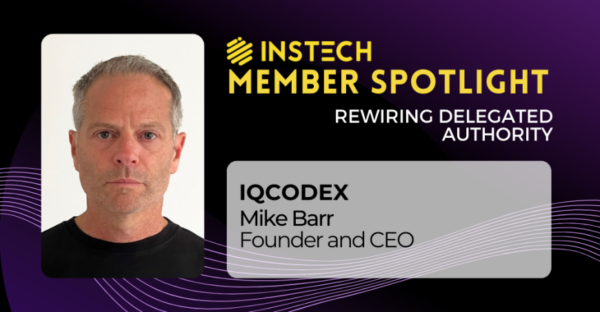Member Spotlight: iQcodex
Why did you found iQcodex?
iQcodex spun out of Watertrace. I founded Watertrace in 2002 to help insurance companies manage their data relating to delegated authority business. Delegated authority refers to partnerships between insurers and managing general agents (MGAs). An insurer ‘delegates’ to an MGA the permission to underwrite particular types of risks on the insurer’s behalf.
We found that Watertrace’s technology could be applied beyond delegated authority. We spun out iQcodex in 2010 to offer a decision-making platform for business processes to other parts of the insurance market, banks, asset managers and other financial services companies.
iQcodex focuses on helping companies transform their business digitally in three areas: data, processes and decision-making.
Why is data management a challenge in delegated authority?
Delegated authority underwriting involves a very long value chain. The policyholder’s relationship is with a retail broker or agent. The broker collects information about the risk which is passed on to the MGA, sometimes through a wholesale broker. The MGA aggregates data from many policyholders to send to a broker, who may make further aggregations before sending it to the insurer. This long value chain causes three problems.
The first problem is poor data quality. When the data reaches the insurer, it has been manually manipulated or rekeyed many times by different organisations. This means it may include errors, omissions or other issues. As a result, the data needs to be validated before it can be used for decision-making.
The second problem is inconsistency. Each organisation that handles the data has its own requirements and perspective, which affects how the data looks when it is received by the insurer.
The third problem is the cost associated with handling data manually. It takes time for people to receive the data, interpret it, validate it and put it into the necessary systems and formats.
How does iQcodex help insurers solve these problems?
Once insurers receive delegated authority data, usually in a spreadsheet, iQcodex software helps insurers ingest, transform, enrich and validate that data.
Along with the software platform to achieve straight through processing (STP), we provide a BPO service through an offshore processing unit that has been running for 8 years. As a result, we have built up terabytes of delegated authority data experience. Now we have trained machine learning algorithms on this data, enabling us to automate those data processes for insurers.
Once the data has been ingested, transformed, enriched and validated, iQcodex also helps transfer data to the right location. Insurers need to store this data in different places for financial reporting, actuarial assessment, and portfolio management. They also need to transfer the data to reinsurers.
Is there a human in the loop?
Data governance and controls are an important aspect of what iQcodex does. Previously, if data included errors or omissions, it relied on someone noticing the error and then took more communication and time to solve, or the incorrect data would go unnoticed in the insurers’ systems.
iQcodex provides a workflow on top of the data processing platform that enables low-quality data to be corrected. For example, if a transaction has a missing number or date associated with it, our machine learning model predicts what the correct data should be. The relevant person in the organisation receives an email asking them to accept or reject the suggested correction. If accepted, the new data goes into the database. If rejected, it presents a number of options to proceed, including adding different information manually or sending an automated email asking the organisation that provided the data to update it.
What other benefits does better management of delegated authority data bring?
Insurers with faster access to high-quality data are better equipped to make strategic decisions. If an insurer understands in more detail the portfolio of risks an MGA has underwritten on its behalf, it can allocate capital more effectively and efficiently, or help the MGA source more business in an area which is in its risk appetite.
Beyond data, what other problems do insurers face with delegated underwriting?
For insurers, there are other time-consuming processes associated with delegated authority underwriting.
This starts with product governance, which includes identifying a target market, creating a product and approving that product with the correct oversight. The next aspect is onboarding a new MGA, which involves a set of risk assessments and due diligence procedures. After onboarding the MGA, insurers then agree the ‘binder’ or ‘program’ (the specific contract that sets out the terms on which the MGA can underwrite on the insurer’s behalf). Once the contract is agreed, the data management process needs to be set up, including oversight so that there are processes in place if data is not sent on time, for example. For some MGAs, the insurer may also conduct regular audits. Then there is a renewal process for the contract.
All these aspects involve different stakeholders, feedback loops and documents. iQcodex provides what we call a ‘delegated lifecycle management ecosystem’, which is a set of pre-built workflows that help insurers to manage these processes efficiently. It takes a matter of hours to configure for a new client.
What clients does iQcodex work with that you can name?
iQcodex works with the AXA Group, including AXA UK and AXA XL, Chubb, Markel, Ascot, Apollo, RenaissanceRe, Flood Re, Convex and others.
Why has iQcodex joined InsTech as a corporate member?
InsTech has a growing network that we want to engage with. Because InsTech is a trusted third party, it is a good organisation to help tell our story to others in the insurance market. We have been impressed by how InsTech has helped other organisations, so we wanted to join the network.
What sort of companies would iQcodex like to connect with?
We are interested to speak to insurers and reinsurers about the challenges they are facing with delegated authority underwriting data and processes. You can reach out to me on LinkedIn.


